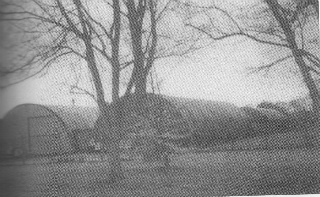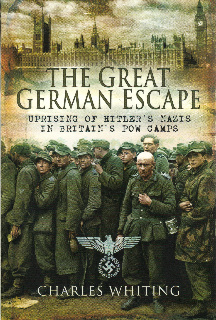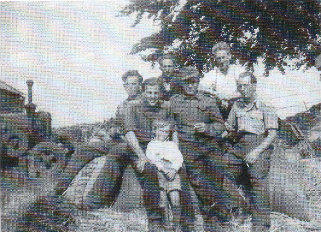WW2 German Prisoners of War
 I am currently working on a story about Karl, a German prisoner of war in World War Two who is sent to a small English farm to work, where he meets Jean, the daughter of the farmer. Fraternisation between the prisoners and the local population is forbidden, until after the war but then their problems are only just beginning.
I am currently working on a story about Karl, a German prisoner of war in World War Two who is sent to a small English farm to work, where he meets Jean, the daughter of the farmer. Fraternisation between the prisoners and the local population is forbidden, until after the war but then their problems are only just beginning.
This has involved some interesting research during which I discovered that in December 1944 there was a carefully orchestrated mass break-out of German prisoners intent on marching to London and taking the city with the help of German parachutists. This was to take place simultaneously with the Ardennes counter-offensive (called the Battle of the Bulge) launched by the Germans to stem the advance of the Allies after D-Day. This is not as crazy as it seems; there were 400,000 German prisoners in captivity in the UK after D-Day (June 6 1944) and most of the British and American troops were fighting on the continen; there were few to defend London. Luckily British Intelligence, using interviews with new prisoners and information picked up at Bletchley Park, had an idea what was afoot and were able to nip it in the bud. There was no parachute drop and the German counter-attack in the Ardennes failed.
The prisoners were all interrogated when they first arrived and were categorised according to their belief in the Nazi doctrine. They were either white, grey or black. The whites were against Hitler and only wanted the war to end so that could go home; they posed no threat. The blacks were ardent Nazis and believed in the invincibility of the Fuhrer. The vast majority were grey, that is, they fought for the Fatherland and their families, and had no strong feelings about Hitler. Usually the blacks were segregated and sent to more remote camps, but with the huge influx of prisoners arriving in the autumn of 1944, some slipped through the net and were sent to ordinary camps. Put all three categories together and there was bound to be trouble. Although my book is a work of fiction, I have drawn heavily on Charles Whiting's book, The Great German Escape, for much of my research and must thank Gil Whiting for permission to use the photograph and cover on this blog.
Many of the prisoners were sent out to work on local farms. When the war ended, the UK government was slow in repatriating them because the country was desperately short of labour both on the farms and in rebuilding and repairing bomb damage, and they were n, who had come to like living in the UK, did not want to return home, especially if their home was in the Russian zone. Some went home and came back again. 24,000 settled in the UK. Another book I found useful for this aspect is Robert Quinn's Hitler's Last Army.
 In December 1946 the ban on fraternisation was lifted and many prisoners were invited into British homes for Christmas. In March the following year, the ban on English girls marrying Germans was cancelled. The reaction of the population to this was mixed; some still hated the Germans and vilified the girls who went out with them. Others were more understanding and hospitable.
In December 1946 the ban on fraternisation was lifted and many prisoners were invited into British homes for Christmas. In March the following year, the ban on English girls marrying Germans was cancelled. The reaction of the population to this was mixed; some still hated the Germans and vilified the girls who went out with them. Others were more understanding and hospitable.
This is the main thread of the book but there are others which I will write about in my next blog.
Picture by kind permission of The History Press.
